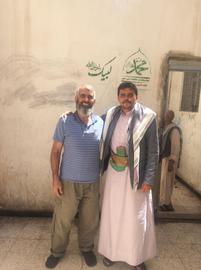Thousands across the Arab world, Europe and elsewhere have condemned the death sentence handed down to Hamid bin Haydara, a prominent member of the Baha’i community in Yemen. On Sunday, March 4, Saleh Khatib al-Razehi, an activist with Yemen’s Peace and Development Organization, visited Haydara in prison to express support and pass on messages of solidarity.
Houthi authorities, who control large parts of the country, handed down the sentence against Hamid bin Haydara on January 2. The Specialized Criminal Court in the capital city Sanaa found the Baha’i Yemeni citizen guilty of communicating with Israel and forging official documents, according to a Yemen-based human rights organization.
Activist al-Razehi posted a photograph of Haydara and himself on his Facebook page and reported that Haydara, who has endured periods of torture during his four years in detention, was generally in good health and sent greetings to all those who asked after him.
Haydara was arrested in December 2013, at a time when Yemen’s official government was still in control, and prior to the Houthis’ revolt and eventual seizure of the capital. Upon establishing authority, the Houthis intensified persecution of Yemeni Baha’is which, as IranWire has reported before, is suspected to be at the instigation of elements in the Iranian government.
Haydara’s trial in January failed to have even a semblance of justice. According to reports, he was prevented from attending his own trial. The judge, Abdu Ismail Hassan Rajeh, not only called for Haydara’s public execution and confiscation of all of his assets, he also called for the disbanding of all Baha’i assemblies in the country. Ever since the Iranian government unleashed attacks on Baha’is in the early 1980s within Iran, nowhere has this religious community, which is known for its peaceful and law-abiding practices, faced such blatant persecution. There are Baha’is communities in almost every part of the world.
The thin justification for the charges against Hayadra is his communication with the governing body of the Baha’i faith, which is located in Haifa, Israel. The fact that the Baha’is are in Haifa dates back to decades before the founding of the State of Israel – when the faith’s founder was exiled to a penal colony in Ottoman Palestine (which eventually became Acre, Israel, on the Bay of Haifa), where he later died.
International Outrage as "Iranian Brothers" Help Fuel the Houthis' Hatred
A spokesperson for the US State Department, Heather Nauert, said that the US was “deeply concerned by harassment and detention of Baha’is” and added that Haydara’s sentence, together with other arrests, showed a “persistent pattern of persecution” in Yemen. The US has called on the Houthis to end Baha’i persecution and release those detained.
In Europe, 103 members of the European Parliament and national parliaments from countries including Austria, France, Germany, Ireland, Spain, the Netherlands and the United Kingdom signed a letter last week calling for the release of Haydara and all other Baha’i prisoners in Yemen. The European Parliament’s Subcommittee on Human Rights also addressed the issue in January.
Amnesty International, Human Rights Watch, the Yemeni rights organization Mwatana and several UN authorities have also called for Haydara’s release and an end to persecution of Yemen’s Baha’is.
“Hamed Kamal Haydara’s persecution and death sentence are emblematic of the Houthis’ broader attack on the Baha’i community,” said Sarah Leah Whitson, Middle East director at Human Rights Watch. “Rather than continue these grave injustices, the Houthis should allow Haydara and other wrongfully held Baha’i men to return home to their loved ones.”
At least six other Baha’is continue to be held in Yemen. One of them, Keyvan Ghadari (whose name is sometimes spelled Kaiwan or Qadari) is an Iranian national who has lived all his life in Yemen. He has been detained since August 2016. The other detainees include Akram Ayash, Wael al-Ariqi, Walid Ayyash and Badullah Sanai’i.
As previously reported by IranWire, the Houthis seem to be taking their direction from Iranian authorities in their persecution of the Baha’is. Iran’s highest authorities, including the Supreme Leader Ali Khamenei, signed an official policy in 1991 to not only persecute the Baha’is in Iran, but to export this persecution around the world.
The Houthis’ approach to human rights, meanwhile, might be surmised from a slogan emblazoned on their flag: “Curse on the Jews.” And yet the persistent attack on Baha’is seems to come from a particular, narrow faction within the Houthis. A Houthi communication official, who spoke to IranWire on the condition of anonymity, confirmed this.
“They act under the guidance of our Iranian brothers,” he said. “They know who the enemies of Islam are.”
visit the accountability section
In this section of Iran Wire, you can contact the officials and launch your campaign for various problems

























comments